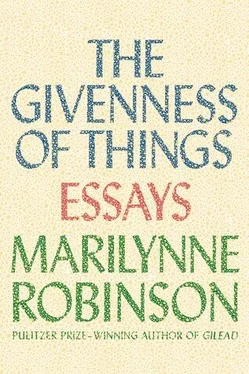Marilynne Robinson - The Givenness of Things
Здесь есть возможность читать онлайн «Marilynne Robinson - The Givenness of Things» весь текст электронной книги совершенно бесплатно (целиком полную версию без сокращений). В некоторых случаях можно слушать аудио, скачать через торрент в формате fb2 и присутствует краткое содержание. Год выпуска: 2015, Издательство: Farrar, Straus and Giroux, Жанр: Публицистика, Философия, Критика, на английском языке. Описание произведения, (предисловие) а так же отзывы посетителей доступны на портале библиотеки ЛибКат.
- Название:The Givenness of Things
- Автор:
- Издательство:Farrar, Straus and Giroux
- Жанр:
- Год:2015
- ISBN:нет данных
- Рейтинг книги:5 / 5. Голосов: 1
-
Избранное:Добавить в избранное
- Отзывы:
-
Ваша оценка:
The Givenness of Things: краткое содержание, описание и аннотация
Предлагаем к чтению аннотацию, описание, краткое содержание или предисловие (зависит от того, что написал сам автор книги «The Givenness of Things»). Если вы не нашли необходимую информацию о книге — напишите в комментариях, мы постараемся отыскать её.
, the incomparable Marilynne Robinson delivers an impassioned critique of our contemporary society while arguing that reverence must be given to who we are and what we are: creatures of singular interest and value, despite our errors and depredations.
Robinson has plumbed the depths of the human spirit in her novels, including the National Book Critics Circle Award-winning
and the Pulitzer Prize-winning
, and in her new essay collection she trains her incisive mind on our modern predicament and the mysteries of faith. These seventeen essays examine the ideas that have inspired and provoked one of our finest writers throughout her life. Whether she is investigating how the work of the great thinkers of the past, Calvin, Locke, Bonhoeffer-and Shakespeare-can infuse our lives, or calling attention to the rise of the self-declared elite in American religious and political life, Robinson's peerless prose and boundless humanity are on display. Exquisite and bold,
is a necessary call for us to find wisdom and guidance in our cultural heritage, and to offer grace to one another.














